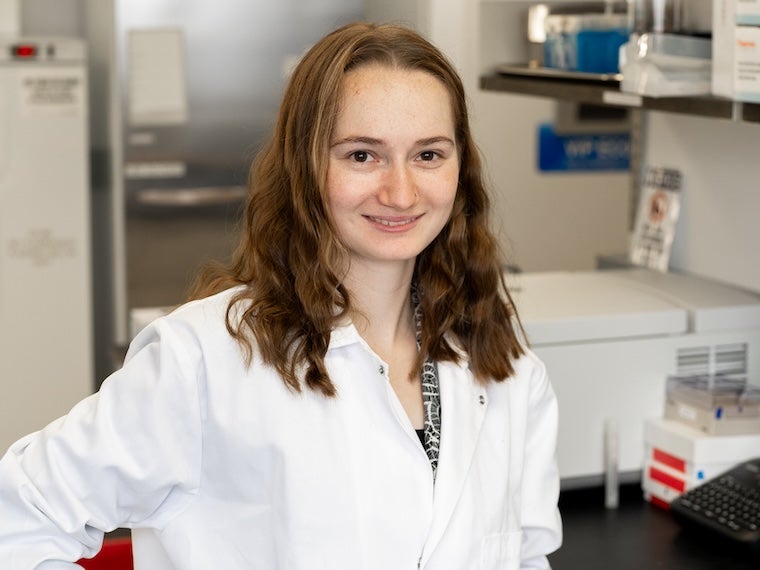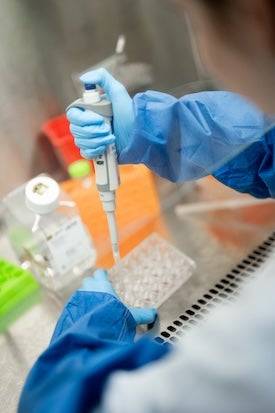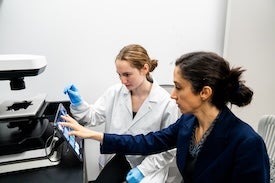Kayla Elias ’25 Conducts Research at the Elahi Lab
October 11, 2024
Communications Staff

Kayla Elias ’25 at her internship at the Elahi Lab in New York City, NY.
Photo credit: Todd France
Kayla Elias ’25 knows exactly what she wants to do after college, and is setting herself up perfectly via her Internship+ program placement at the Elahi Lab at the Friedman Brain Institute at the Icahn School of Medicine at Mount Sinai in New York. At Oberlin, Kayla is on the pre-medical track, majoring in neuroscience and biochemistry. As an aspiring physician-scientist, she is following Dr. Fanny Elahi, who does just that, and is learning how Dr. Elahi balances research and clinic work.
Describe what you’re doing this summer in your internship.
I am researching how brain vascular pathology can contribute to cognitive impairment and dementia. The Elahi lab investigates how core features of vascular pathology potentiate or accelerate neurodegenerative disease pathologies. For my project, we are focusing on the pathogenesis of a monogenic form of disease called CADASIL which is caused by mutations in the NOTCH3 gene. People affected can suffer from migraines, ischemic strokes and cognitive impairment. I am growing and differentiating induced pluripotent stem cells with the goal of modeling the blood brain barrier and how it can be compromised in disease. In addition, I am learning in silico bioinformatics techniques to analyze dysregulated gene expression in CADASIL based on transcriptomics data.
How did Oberlin shape or influence you to pursue this internship?

In Spring 2023, I took Neurobiology of Disease and Neurotoxicology and Neurodegeneration Lab with Professor Gunnar Kwakye, as well as Molecular Biology, Cellular Biology, and Biochemistry with Professor Laura Romberg. I loved these three classes, especially in tandem, because they inspired me to think about how a biochemical interaction can cause a series of molecular biological events leading to macroscopic symptomatology that impacts a patient’s quality of life. Therefore, they inspired me to pursue research questions such as those being addressed in the Elahi Lab about how molecular biological signaling pathways can be targeted to understand and treat neurological diseases.
How does pursuing this internship align with your post-college life and career goals?
This is the exact kind of research I aspire to pursue in my own career. I hope to study the molecular pathogenesis of neurological disease, neurodegeneration and/or cancer, while pursuing Neurology or Neurosurgery as a physician-scientist. Dr. Elahi is a physician-scientist with an MD/PhD and I have been able to witness how she balances research and clinic. I’ve performed research, shadowed patient visits, and witnessed how the lab has set up an observational study of CADASIL patients, both remote and in-person, to assess samples for possible diagnostic biomarkers, while in parallel building mechanistic models to identify therapeutic targets.
How has the liberal arts education and way of thinking shaped how you approach science and research?

Medicine and research are, by nature, interdisciplinary, combining numerous approaches and perspectives to problem-solving. Medicine alone combines STEM and social science with communication skills, emotion and empathy with strength and resilience, and studied knowledge with adaptability. The cornerstones of research are also communication and organizational skills culled in multiple subjects, as well as creativity in developing an approach to a research question. For example, it is best to think about organizing research in terms of a story with a beginning–research question, middle–organized experimentation, and end–results and conclusions. Oberlin’s liberal arts education encourages a breadth of training, preparing students to acquire these useful transferable skills. Also, science and medicine are both team sports and involve working with others who may think differently, and each contributes a unique set of ideas to problem-solving. Oberlin is certainly an environment where unique individuals with their own sets of interests and backgrounds merge to create a multifaceted community which thus exposes students to different perspectives.
If you're interested in a summer internship, connect with the Career Exploration & Development team to learn more about exploring career interests, gaining real-world experience, and developing a professional network.
You may also like…
Nikki Keating ’25 earns Fulbright to teach English
The recent graduate will complete her teaching assistantship in Kenya.
From Oberlin research to Cleveland Clinic labs
Two young alumni tackle the fascinating challenges of brain cancer research.
Teamwork For the Win
Alexis Dill ’20 is using the communication skills she honed at Oberlin to promote the Worcester Red Sox.


